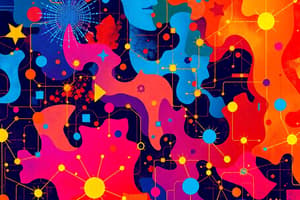Podcast
Questions and Answers
Which of the following best describes the key difference between data and information?
Which of the following best describes the key difference between data and information?
- Data is structured and organized while information is raw and unprocessed.
- Data is raw, unprocessed facts, and information is processed, organized, and structured data that is made meaningful. (correct)
- Data is meaningful and useful, while information is unprocessed facts.
- Data and information are interchangeable terms.
What type of knowledge is easily communicated through manuals and documentation?
What type of knowledge is easily communicated through manuals and documentation?
- Intuitive knowledge
- Implicit knowledge
- Tacit knowledge
- Explicit knowledge (correct)
Which of the following scenarios best illustrates implicit knowledge?
Which of the following scenarios best illustrates implicit knowledge?
- Following a detailed recipe to bake a cake.
- Consulting a troubleshooting guide for a computer program.
- A carpenter reading a book about woodworking techniques.
- A software user instinctively using shortcuts and workarounds. (correct)
Which of the following best describes tacit knowledge?
Which of the following best describes tacit knowledge?
What is the defining feature of an 'information society'?
What is the defining feature of an 'information society'?
Which of the following best describes the role of ICTs in an information society?
Which of the following best describes the role of ICTs in an information society?
What is a key challenge associated with the 'digital divide'?
What is a key challenge associated with the 'digital divide'?
According to the content provided, which of the following is NOT a core component of information literacy?
According to the content provided, which of the following is NOT a core component of information literacy?
How does information literacy directly contribute to lifelong learning?
How does information literacy directly contribute to lifelong learning?
What is a primary benefit of information literacy in the context of civic life?
What is a primary benefit of information literacy in the context of civic life?
Flashcards
What is data?
What is data?
Unprocessed facts and figures, the raw material of knowledge.
What is information?
What is information?
Processed, organized, structured, or presented data, making it meaningful and useful.
What is knowledge?
What is knowledge?
Understanding and interpretation of information, contextualized within a broader framework.
What is explicit knowledge?
What is explicit knowledge?
Signup and view all the flashcards
What is implicit knowledge?
What is implicit knowledge?
Signup and view all the flashcards
Digital Divide
Digital Divide
Signup and view all the flashcards
Information Literacy
Information Literacy
Signup and view all the flashcards
Information Society
Information Society
Signup and view all the flashcards
Information and Communication Technology (ICT)
Information and Communication Technology (ICT)
Signup and view all the flashcards
Empowered Decision-Making
Empowered Decision-Making
Signup and view all the flashcards
Study Notes
Information and Knowledge
- Information is processed, organized, and meaningful data.
- Data is unprocessed facts and figures.
- Knowledge is understanding and interpretation of information within a broader context.
Types of Knowledge
- Explicit Knowledge: Easily communicated, shared, and documented (e.g., user manuals).
- Implicit Knowledge: Less formalized, often learned through experience, not explicitly taught (e.g., software shortcuts).
- Tacit Knowledge: Deeply personal, hard to formalize. Acquired through personal experience (e.g., craftsperson's techniques).
Information Society
- An information society is driven by creating, distributing, and using information.
- Information and communication technologies (ICTs) are central to this society.
- ICTs, like computers, internet, and mobile devices, enable vast information creation, storage, and retrieval.
- Information becomes a valuable resource.
- Social organization changes; education, jobs, and interactions transform with technology.
- Globalization is facilitated by information exchange across borders.
- The networked society is characterized by strong interconnectedness.
- Work patterns are shifting to flexible arrangements and remote work facilitated by technology.
Digital Divide
- The digital divide gaps exist between different groups with access to technology.
- Access, digital literacy, and affordability are critical aspects of the digital divide.
- Challenges exist in rural areas, low-income communities, and developing nations with affordability as a critical barrier.
Information Literacy
- Information literacy includes recognizing information needs, locating, evaluating, and using information effectively.
- It's crucial for navigating the information landscape effectively.
- It includes identifying information needs, accessing information, evaluating sources critically, using information ethically and legally, and for a specific purpose.
Value and Importance of Information Literacy
- Information literacy enables empowered decision-making, critical thinking, and problem-solving.
- It is vital for lifelong learning, research, and academic/professional success.
- Empowers individuals to combat misinformation, participate in civic life, navigate the constantly changing information landscape, and use information ethically.
Ages of Information
- Oral Age: Information passed orally through generations.
- Manuscript Age: Information recorded physically with writing systems.
- Print Age: Mass production of printed materials made information widely accessible.
- Electronic Age: Information transmission via electronic media like radio and television, establishing the digital age.
Studying That Suits You
Use AI to generate personalized quizzes and flashcards to suit your learning preferences.




